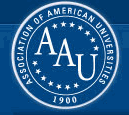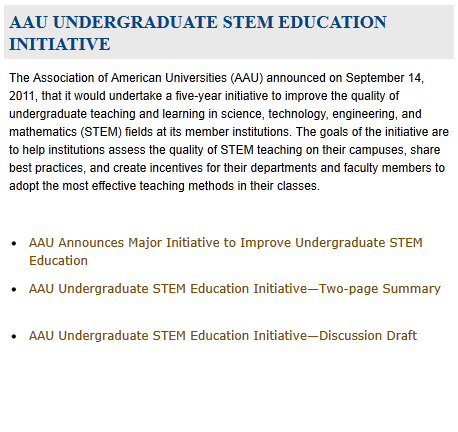|
News & Views item - September 2011 |
![]() Association of American Universities Launches Undergraduate
STEM Education Initiative. (September 17, 2011)
Association of American Universities Launches Undergraduate
STEM Education Initiative. (September 17, 2011)
 Founded
in 1900 the Association of American Universities (AAU) is an association of
61of the leading public and private research universities
in the United States (59) and Canada (2). This week the AAU announced it is to
undertake a 5-year program to improve education in science, technology,
engineering and mathematics (STEM).
Founded
in 1900 the Association of American Universities (AAU) is an association of
61of the leading public and private research universities
in the United States (59) and Canada (2). This week the AAU announced it is to
undertake a 5-year program to improve education in science, technology,
engineering and mathematics (STEM).
Former president of Cornell University and recently elected president of AAU, Hunted Rawlings was interviewed by ScienceInsider as to what the AAU hopes to achieve.
Clicking on the bullet points below accesses the linked PDF files

Here is a summary of what he had to say:
Now there's a sense within the community that it's been shown that [the] new methods of engaging students more intensively are showing results.… Scientists, after all, are evidence-based people. They want to see evidence before they are going to make a change in something as important as this. And I think the evidence is mostly in, and usable... we've had enough experience with undergraduate research programs to understand that students are more likely to become scientists if they are actively engaged in research [and] there are better ways now to disseminate best practices.
One thing we'd like to happen is for [four to six of the universities] to volunteer to have their campuses become pilots for these new practices... To be successful, this can't be just individual courses ... because if you change the introductory course but not the follow-up courses, you won't make a lot of progress. In order for universities to do this, to revise a sequence of courses over several disciplines, we're going to need some real incentives. A grant would provide faculty some time to really work on this.
We'll also need to find a better way of incenting serious work on undergraduate education. That could come through teaching awards. But it could also comes through making it clear that serious work on improving undergraduate education will be rewarded come salary time. I think that's essential. I don't think we should beat around the bush. [W]e're trying to get greater adoption of best practices. It's not rocket science. But it is a matter of overcoming barriers that we all know are there, by changing the way you teach your course, or developing a new sequence of chemistry courses. That stuff is hard. Most of us teach the way we've learned. And once we have a syllabus in place, we don't want to spend a lot of time altering it.
It's a 5-year project, because this is a deep-seated, long-term problem... We will look to see if these new methods are producing better results... We want to create a framework to assess and monitor the results.
One of the big issues is the 40% of students who declare a STEM major and then drop out.